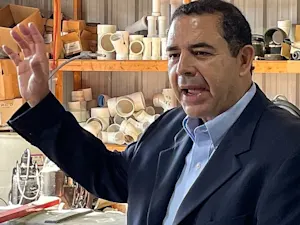
Newsom Under Fire for Border Patrol Showdown
California Gov. Gavin Newsom's bold plan to wrest control of redistricting from the state's independent commission was meant to be a defining moment in the fight against what Democrats call Texas-style gerrymandering. Instead, the event turned into a political spectacle when uniformed Border Patrol agents reportedly showed up uninvited outside the venue, casting a shadow over Newsom's kickoff for what he called the Election Rigging Response Act. The surreal scene unfolded as Newsom unveiled a proposal that would let California voters approve a new congressional map designed to give Democrats five additional House seats, directly countering a Republican-led redistricting effort in Texas.
A Turf War Goes Theatrical
The setting was the Japanese American National Museum in Los Angeles, a location chosen for its symbolic weight in the fight for democracy and civil rights, as reported by The Guardian. As Newsom spoke passionately about defending American democracy from what he called an authoritarian power grab, federal agents from U.S. Customs and Border Protection (CBP) fanned out across the street. The agents, led by Gregory Bovino, head of the El Centro Border Patrol sector, described their presence as routine "roving patrols," according to ABC7 News. Agents reportedly made at least one arrest outside the venue.
Newsom scoffed at the timing, suggesting the operation was no coincidence but a deliberate attempt by former President Donald Trump and his allies to intimidate Democrats. Los Angeles Mayor Karen Bass echoed this sentiment describing the presence of federal agents as "unbelievably disrespectful" and calling it a "provocative act" meant to "thumb their nose" at the governor, as reported by ABC7 News. She added, "They're talking about disorder in Los Angeles and they are the source of the disorder in Los Angeles right now. This is just completely unacceptable."
The Department of Homeland Security pushed back, insisting the patrols were standard law enforcement operations aimed at keeping the city safe, not political theater. DHS assistant secretary, Tricia McLaughlin, said in a post on social media, "Our law enforcement operations are about enforcing the law – not about Gavin Newsom. CBP patrols all areas of Los Angeles every day with over 40 teams on the ground to make LA safe," as reported by The Guardian.
The Stakes of the Redistricting Battle
Newsom's plan, reportedly dubbed by him the "Election Rigging Response Act," seeks to override California's independent redistricting commission — which has drawn maps since 2010 to prevent partisan gerrymandering. The governor's proposal would allow the state legislature to redraw congressional districts if Texas or any other Republican-led state pushes through partisan maps mid-decade. The goal is to neutralize Texas's effort, which aims to add five Republican seats to the U.S. House by redrawing districts outside the usual post-census cycle.
California currently holds 52 House seats, with Democrats controlling 43. Newsom's plan would attempt to preserve or even increase that advantage by countering what Democrats see as an aggressive GOP power grab. The stakes are high: a Democratic House would complicate President Trump's second term, while a Republican majority could accelerate conservative policy goals.
The Jeer of Political Grandstanding
The arrival of Border Patrol agents at Newsom's event added a layer of political theater that critics say distracts from the substantive debate over redistricting. The federal presence was seen by many as a calculated move to overshadow the governor's announcement and rally conservative opposition. Newsom and his allies framed the agents' operation as a form of intimidation, while federal officials insisted it was routine law enforcement.
This clash highlights the increasingly theatrical nature of American politics, where policy battles are fought not only in legislatures and courts but also on the streets and in the media spotlight. The spectacle of federal agents confronting a state governor at a symbolic venue underscores the deep divisions and high emotions surrounding redistricting and election integrity.
The Fear of Institutional Breakdown
Beyond the political grandstanding lies a genuine concern about the erosion of democratic norms. Newsom's proposal is a direct response to what Democrats view as an unprecedented and dangerous power grab by Republicans in Texas, who are pushing mid-decade redistricting to entrench their majority. The California governor warned that if left unchecked, such tactics could spread nationwide, undermining the principle of fair representation.
However, the move to override an independent commission raises its own alarms. California voters have historically supported the commission, which was created to reduce partisan influence in map drawing. Polls show strong backing for the independent system, meaning Newsom's plan faces an uphill battle to convince voters to temporarily suspend it. The risk is that the backlash could weaken Democratic control in California and damage Newsom's political standing.
The Sneer of Elite Maneuvering
Critics argue that Newsom's redistricting blitz, while framed as voter empowerment, is also a high-stakes power play by political elites. The proposal would concentrate map-drawing authority in the hands of the Democratic-controlled legislature, sidelining the independent commission that voters created to ensure fairness. This move risks alienating voters who value transparency and good governance.
Adding to the complexity, former California governor Arnold Schwarzenegger, a Republican who championed the independent commission, has voiced opposition to Newsom's plan, as reported by The Guardian. Schwarzenegger's stance lends credibility to the argument that the governor's effort is less about democracy and more about partisan advantage. The campaign to pass the measure will be costly and contentious, drawing national attention and deep-pocketed donors on both sides.
What Comes Next?
The battle over redistricting in California is far from over. Newsom has reportedly called for a special election on Nov. 4 to let voters decide on the new map. The outcome will hinge on whether Democrats can persuade their base to accept a temporary suspension of the independent commission in the name of fighting back against Texas's aggressive tactics.
Meanwhile, the federal government's unexpected presence at Newsom's event serves as a reminder that this fight is not just about lines on a map. It is a proxy war over the future of American democracy, played out on multiple fronts — from state legislatures to federal agencies, from courtrooms to public rallies.
For voters watching this drama unfold, the question remains: will this redistricting showdown strengthen democracy by protecting fair representation, or will it deepen divisions and erode trust in the institutions meant to safeguard it? The answer may shape the political landscape for years to come.
References: How Newsom's Retaliation to Texas Redistricting May Backfire | Federal agents conduct operation in Little Tokyo, Los Angeles, outside venue where Newsom announced redistricting plans | Newsom says California will push to redraw maps in riposte to Texas plan






















